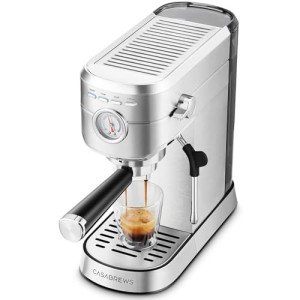Undeniable Proof That You Need Commercial Espresso Machines
The Rise of Home Espresso Machines: A Comprehensive Guide
As coffee enthusiasts continue to look for fresh and delicious brews in your home, the popularity of home espresso machines has risen in current years. No longer simply the domain of coffee shops and cafe, these machines empower individuals to craft barista-quality espresso beverages from the convenience of their kitchens. This short article will check out the various types of home espresso machines, their functions, and considerations for selecting the right one. In addition, it will provide a choice of FAQs to assist potential buyers make notified decisions.
Types of Home Espresso Machines
Home espresso machines can be categorized into a number of classifications based upon their mechanisms and user-friendliness. Each type has its special functions, pros, and cons.
Type
Description
Pros
Cons
Manual Espresso Machines
Requires the user to manually manage the developing procedure, involving methods like pulling a lever to create pressure.
- Complete control over developing process
- Compact design
- Requires ability and practice
- Time-consuming
Semi-Automatic Machines
Machine automates water flow and pressure, but the user still manages the dosing and period of the brewing process.
- Balance of automation and control
- Versatile
- Learning curve for refining methods
Fully Automatic Machines
Automates the whole developing process, from grinding to brewing, typically with programmable settings for personalized beverages.
- Extremely user-friendly
- Quick and practical
- Less control over the developing process
- Higher rate point
Pill or Pod Machines
Uses pre-packaged espresso pills or pods to create coffee rapidly and quickly.
- Extremely easy to use
- Minimal clean-up
- Limited flavor range
- More pricey per cup than ground coffee
Super-Automatic Machines
Combines features of totally automatic machines with integrated grinders, allowing users to brew entire bean espresso and milk-based drinks with one touch.
- All-in-one convenience
- Ideal for milk-based drinks
- Often the most costly
- Can be large
Features to Consider
When selecting a home espresso machine, prospective buyers ought to think about the following features to guarantee they pick a machine that fulfills their requirements:
Grinder Type:
- Built-in grinders can offer fresher grounds but may need more maintenance.
- Separate grinders enable more personalization of grind size.
Pressure:
- Look for machines that produce a minimum of nine bars of pressure, which is optimum for brewing espresso.
Water Temperature Control:
- Machines with adjustable temperature settings permit better extraction of flavor from beans.
Milk Frothing Options:
- Consider whether you desire a manual steam wand for frothing or an automatic milk frother for benefit.
Alleviate of Cleaning:
- Machines with detachable parts and self-cleaning functions significantly decrease cleanup time.
Size and Design:
- Ensure the machine fits conveniently in your kitchen area and aligns with your aesthetic preferences.
Budget:
- Set a budget before beginning your search, as rates can range substantially from affordable models to high-end machines.
Advantages of Home Espresso Machines
Owning a home espresso machine offers many benefits:
- Cost-Effective: Over time, brewing espresso in the house can conserve coffee lovers cash compared to frequent café gos to.
- Modification: Users can experiment with different beans, grind sizes, and brewing techniques to find their best cup.
- Convenience: The ability to brew espresso at any time removes the need to head out to a café, especially useful throughout late nights or early mornings.
- Quality Control: With a home machine, individuals have total control over the quality of ingredients and developing processes.
Disadvantages of Home Espresso Machines
Nevertheless, there are some drawbacks to consider:
- Initial Investment: High-quality espresso machines can be pricey, needing a substantial upfront investment.
- Learning Curve: Mastering the art of espresso developing can require time and practice, which might be frightening for beginners.
- Upkeep: Like any appliance, espresso machines require regular cleaning and maintenance to ensure optimum efficiency.
FAQs
1. What is the very best type of home espresso machine for newbies?
Answer: For newbies, a semi-automatic machine is typically suggested as it uses a balance between control and automation, allowing you to find out the fundamentals without overwhelming complexity.
2. Just how much should I invest on a home espresso machine?
Answer: Entry-level machines can start around ₤ 100 to ₤ 300, while higher-end models can range from ₤ 500 to over ₤ 2000. It's necessary to set a budget based upon your expected use and desired features.
3. Do I require a separate grinder?
Response: While some espresso machines feature built-in grinders, buying a different grinder permits greater personalization and ensures better quality grounds.
4. How often should I clean my espresso machine?
Response: Cleaning frequency can vary by machine type, however it's usually recommended to clean up the machine after each use and perform deep cleanings weekly or month-to-month, depending on use.
5. Can Top Espresso Machines make milk-based drinks with any espresso machine?
Response: Not all machines come with milk frothing abilities. If you delight in drinks like lattes or coffees, try to find a machine with a steam wand or automatic frother.
Home espresso machines are transforming the method coffee aficionados enjoy their precious brews. With various types and advanced features offered in the market, there is something for everyone. Whether it's the delight of developing distinct dishes or simply appreciating the best shot of espresso, buying a home espresso machine can enhance both the coffee-drinking experience and the lifestyle for coffee enthusiasts all over. Just like any investment, it is crucial to weigh the advantages versus the prospective downsides and choose a machine that flawlessly fits both your lifestyle and preferences.
